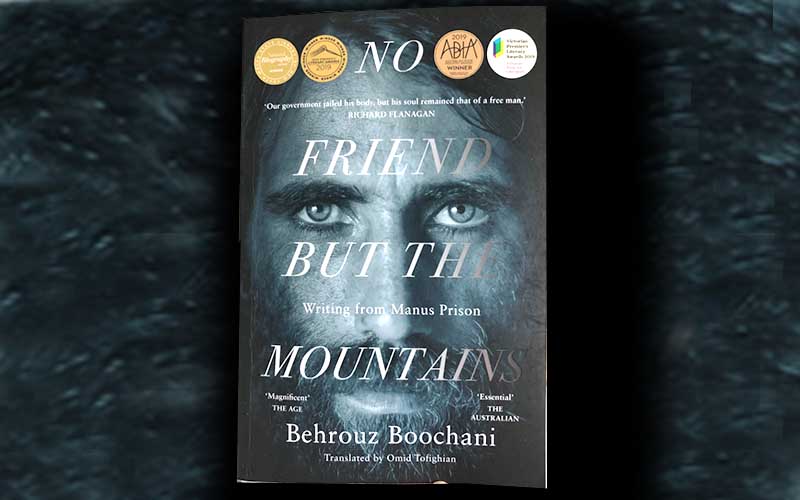This is an indescribably sad book about inhumanity. A man, born and raised in a war zone, escapes his home country with nothing more than his life (and “home” is a word that needs re-thinking in the context of this story) and yes, he gets away and is rescued at sea from a sinking boat by the Royal Australian Navy.
Thank God, you would think. Wouldn’t you?
But he is dumped, with a diaspora of fellow refugees, in an internment camp on Manus Island and is kept imprisoned by the Australian Government, illegally and indefinitely.
This story is told by Kurdish-Iranian journalist Boochani with a harrowing immediacy, in a first person stream of consciousness style which doesn’t so much take you into his confidence as into his body. It’s a very physical story, so much of it felt through the lived experience: the feeling of the waves coming over a sinking boat, the heat of the tropics, the hunger. There is little more than this, the sensations of a daily routine. There is scant past, no future. Just the glow of a cigarette. A wire fence. The smell of dirty men. A day and then another day under surveillance cameras in oversized clothes. Waiting.
The text switches from prose to poems naturally; the poems a philosophical comment on the prose but with a similar rhythm and feel. They’re a pause to put the stuff in a wider context but some of the horror is given in the poems. It doesn’t make it any easier to read.
This story is crushing in so many ways. The descriptions of what happens to desperate men is unexpected and depressing. Men who, if they hadn’t been constantly driven to the edge of survival, might have led kinder lives. I’ve grown up on stories celebrating heroism and self-sacrifice and have a sick feeling that I may have been misled. Boochani paints a different picture of despair, with many examples of the weak tormenting the weaker, wolf-like fights for the largest share of a meagre supply of food. He describes cowardly men screaming at women in an overcrowded boat and young men forcing families away so they can sit down, the greed, the lack of compassion and humanity from those who have had their dignity taken away from them. Once imprisoned, these conflicts are systematically and brutally reinforced.
Boochani talks of the “Kyriarchal System” operating within the prison, a conscious way of conditioning prisoners that aims to destroy any sense of developing community and to pit the men against each other, forcing submission to authority. It is a system that encourages the development of hatred. So the last in the queue goes without, a physical fight is required before medical attention is given, treats are divisive, blocked toilets force indignities, sports and games forbidden, the lack of occupation or any creative outlet leads to apathy.
This is a story of how of men with no agency over their lives lose their humanity. And yet, somehow, Behrous Boochani survives and he manages to communicate these humiliations in a way that doesn’t make the reader feel like a gratuitous spectator, but a witness.
As background if anyone out there does not know: the book was written in Farsi on a smuggled mobile phone and sent, text by text, to a translator. It has won several major literary awards. Behrouz Boochani has recently been granted refugee status by Immigration New Zealand and is to become a Senior Adjunct Research Fellow at the University of Canterbury.


Wow. It’s nice to see that the truth hasn’t been covered up yet another time by fake positivity. Thank you Cristina, for sharing this title… it sure seems like it’s worth reading
LikeLike